初二英语英语情态动词知识点总结含解析百度文库
人教版八年级英语情态动词(完整版)含解析

人教版八年级英语情态动词(完整版)含解析一、选择题1.A lot of online resources ________ be used either by teachers at school or parents at home. A.can B.should C.need D.must2.To my joy, we_________ go to the bank. Mary has lent us some money.A.shouldn’t B.needn’t C.couldn’t D.w ouldn’t 3.—Who’s singing next door? Is it Miss Wang?—It ________ be her. She’s having the board meeting.A.can’t B.shouldn’t C.mustn’t D.needn’t4.It’s of great importance to protect the environment. Each of us ________ take an active part in it.A.can B.may C.would D.should 5.Sorry, smoking is not allowed here. If you ________ , you will be fined according to the rules. A.can B.will C.may D.must6.—Be careful! Fire ________ be dangerous sometimes.—OK. I will put it out right away.A.mustn’t B.should C.can D.needn’t 7.—Will my car be ready by the end of the day?—It ________ be, sir. I’ll call if there’s any problem.A.must B.could C.shall D.should8.We shouldn’t throw any objects from the building. Even a small object ________ cause serious injuries or death, when dropped from a great height.A.must B.should C.may D.need 9.—Dad, must we wait until the light becomes green?—Yes, I am afraid we ________. That’s the traffic rule.A.may B.can C.have to D.need10.—________ you give me a hand? I can’t put up the poster by myself.—No problem.A.Could B.Should C.Need D.Must11.You ________ write the report again because spelling mistakes are not allowed at all. A.must B.can C.may D.could12.—I don’t care what people think.—Well, you _______ . Some opinions are worth weighing.A.should B.might C.could D.would13.— Mom, must I clean my room now?— No, you ________. You can do it after dinner.A.needn’t B.mustn’t C.shouldn’t D.can’t14.—________ I see your ID card? We have to check your personal information.—Sure. Here you are.A.May B.Need C.Should D.Must15.It’s amazing that the pen ________turn voice into text with few mistakes.A.can B.must C.may D.need16.— Zoe, what do you think is the greatest advantage of shopping online?— At least I ______ spend much time going from shop to shop.A.shouldn’t B.can’t C.needn’t D.mustn’t 17.—Have you decided to take up teaching as career after graduation?—I ________ go abroad for further education instead. But it depends.A.must B.should C.may D.shall 18.Please don't make so much noise. I ________ hear the speaker very well.A.needn't B.can't C.shouldn't D.mustn't19.The boy is very brave.I ________ he ________ the tall tree.A.dare say; dares to climbB.dare to say; dare climbingC.dare saying; dares climbD.dare to say; dares climbed20.When I was young, my father ___________ take me to climb the hill which was not far from our house.A.may B.must C.would D.should21.You ______ pay too much attention to your pronunciation, as it is so important in the oral (口头的) test.A.s houldn’t B.mustn’t C.can’t D.needn’t 22.—Shall we go camping this summer holiday?—Nothing________be better.A.should B.could C.must D.may23.My bike was broken yesterday,so I____walk home.A.might B.had to C.must D.could 24.—Ready? Let’s get started, Ma rtin.— Swimming? I just ________ get used to it in winter.A.can’t B.needn’t C.mustn’t D.shouldn’t 25.—Where is Tom? I am considering ________ him about the result of the exam.—Oh. You ________. He has known it already.A.to tell; can't B.telling; needn't C.tell; mustn't D.told; shouldn't 26.— Is the boy over there Tom? He often wears a jacket like that.— It _______ be him. He is absent from school today.A.needn’t B.shouldn’t C.mustn’t D.can’t27.To avoid ________, we’d better ________ the parents’ meet ing online.A.gather; hold B.gathering; hold C.gather; holding D.to gather; to hold 28.— Excuse me, could you tell me where the Nanjing Brocade Museum is?—Go along this road for five minutes. You ________ miss it. It’s a huge building.A.mustn’t B.can’t C.needn’t D.shouldn’t 29.—Must the children leave at six tomorrow morning?—No, they _______. They can have more time to get ready for the trip.A.can’t B.needn’t C.mustn’t D.may not 30.—Why didn’t you tell it to me earlier?— Why ________ I? I want to have my own secret.A.can B.may C.should D.shall 31.—Mum, why do I have to wear a mask before entering the supermarket?—For your health and safety, you ________ be too careful.A.shouldn’t B.can’t C.mustn’t D.needn’t32.You _________ smoke here! Look at the sign. It says "No smoking".A.needn't B.mustn't C.can D.may33.— Listen! Tom ________ be listening to the music while doing his homework.—Let’s go upstairs to remind him to turn it off.A.should B.could C.would D.must 34.—Must I finish all my homework today, Mum?—No, you ________, my dear. You can finish some tomorrow if you like.A.needn’t B.shouldn’t C.can’t D.mustn’t35.—Is that Mr Zhou?—It ________ be him. He has gone to Beijing.A.can B.may C.can’t D.shouldn’t 36.Never throw objects from the building. Even a small object ________ cause serious injuries, or death, when dropped from a great height.A.must B.should C.may D.need37.—I think they are enough. We ________ make so many chairs.—I don’t think so. Because nearly a quarter of them need ________.A.don’t need to; mending B.needed; to be mendedC.don’t need; mend D.need; to mend38.—In China, many parents complain that their children have to stay up late to do the homework.—Don’t worry. The government has realized the problem. I’m sure there ________ be good news soon.A.can B.should C.need D.must 39.—Who is singing next door? It sounds like a young girl’s voice.—It _________ be Jane. But she seldom sings English songs.A.need B.must C.may D.can40.You ________ pay too much attention to protecting yourself if you plan to go abroad. A.mustn’t B.can’t C.shouldn’t D.needn’t 41.When people are waiting at the zebra crossing, cars and buses ________ wait and let them go first.A.must B.may C.can D.need 42.—Shall I tell him the change of the time right now?—I’m afraid you ________, otherwise he will be late for the meeting.A.can B.may C.must D.need 43.—Seventy dollars for such a dress! You ________ be joking!—I’m serious. It’s made of silk from Hangzhou.A.must B.need C.will D.can44.— Excuse me. I haven’t finished reading the book yet. May I keep it a bit longer?— Sorry, you ________. You must return it on time.A.needn’t B.can’t C.won’t D.shouldn’t 45.— The sandstorm in Beijing is so serious this year.— Yes, I wonder when we ________ worry about the air we breathe.A.can’t B.mustn’t C.needn’t D.shouldn’t 46.—Could you tell me how to renew the library books?—With pleasure. You ________ come to our desk every time. It’s easier to renew them online. A.can’t B.mustn’t C.needn’t D.shouldn’t 47.For the safety of the passengers, objects like guns ________ be carried on board. A.may not B.needn’t C.might not D.mustn’t 48.—Mum, I bought some strawberries on my way home.—Oh, you’re so sweet. But the strawberries ________ be put into the fridge for freshnes s. A.must B.can C.may D.need49.— What do you think of the show yesterday?— Some of them were really good but others ________ be better.A.will B.must C.need D.can50.—Will Jim come to Yangzhou for a holiday?—He ________come and it depends on how much homework he will have.A.may B.should C.must D.need【参考答案】***试卷处理标记,请不要删除一、选择题1.A解析:A【详解】句意:很多在线资源既可以供学校的老师使用,也可以供家长在家使用。
八年级英语中情态动词的用法归纳总结

1.情态动词可以用来表示能力和才能:- Can:表示能力和可能性。
例如:I can swim.(我会游泳)- Could:表示过去的能力和可能性。
例如:When I was young, I could run very fast.(我小的时候跑得很快)2.情态动词可以用来表示请求和许可:- Can:表示请求、许可和推测。
例如:Can I borrow your pen?(我可以借你的笔吗?)3.情态动词可以用来表示建议和意愿:- Should:表示应该、建议和责任。
例如:You should study harder.(你应该更加努力学习)- Would:表示愿意、请求和建议。
例如:Would you like some tea?(你想要一些茶吗?)4.情态动词可以用来表示可能性和推测:- Might:表示可能性和推测。
例如:It might rain tomorrow.(明天可能会下雨)- May:表示可能性和推测。
5.情态动词可以用来表示义务和必须:- Must:表示义务和必须。
例如:We must finish our homework.(我们必须完成作业)- Should:表示应该和期望。
例如:You should apologize to her.(你应该向她道歉)总结起来,八年级英语中的情态动词有can, could, may, should, would, might和must,它们可以表示能力、请求、许可、建议、意愿、可能性、推测、义务和必须。
不同的情态动词在不同的语境下有不同的用法和含义,所以需要根据具体语境和意图进行准确使用。
八年级情态动词知识点总结
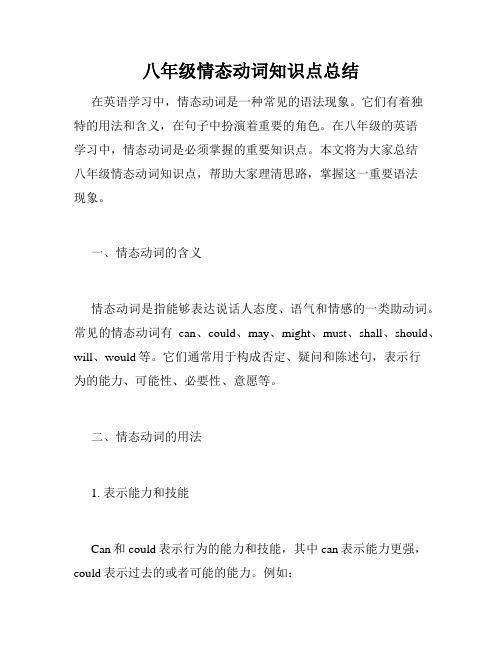
八年级情态动词知识点总结在英语学习中,情态动词是一种常见的语法现象。
它们有着独特的用法和含义,在句子中扮演着重要的角色。
在八年级的英语学习中,情态动词是必须掌握的重要知识点。
本文将为大家总结八年级情态动词知识点,帮助大家理清思路,掌握这一重要语法现象。
一、情态动词的含义情态动词是指能够表达说话人态度、语气和情感的一类助动词。
常见的情态动词有can、could、may、might、must、shall、should、will、would等。
它们通常用于构成否定、疑问和陈述句,表示行为的能力、可能性、必要性、意愿等。
二、情态动词的用法1. 表示能力和技能Can和could表示行为的能力和技能,其中can表示能力更强,could表示过去的或者可能的能力。
例如:He can swim very fast.(他游泳很快。
)She could play the piano when she was young.(她小时候会弹钢琴。
)2. 表示推测和可能性May、might和could用于表示可能性和推测,其中may表示可能性更大,could表示可能性更小。
例如:It may rain tomorrow.(明天可能下雨。
)He might be at home.(他可能在家里。
)3. 表示必要性和义务Must表示强制性的必要性,should表示建议性的必要性,其中must用于肯定句和疑问句,should用于陈述句中。
例如:You must wear a seatbelt while driving.(开车时你必须系上安全带。
)You should eat more vegetables.(你应该多吃蔬菜。
)4. 表示意愿和请求Will、would和can用于表示意愿和请求,其中will和would用于陈述句和状语从句中,can用于疑问句和请求。
例如:He will help me with my homework.(他会帮我完成作业。
初中英语知识点归纳情态动词的概率和态度

初中英语知识点归纳情态动词的概率和态度情态动词是英语中常用的一类动词,用来表达说话人对某种行为或情况的态度、看法、意愿、能力等态度和概率。
情态动词有很多种,包括can、could、may、might、must、shall、should、will、would等。
它们在句子中的位置一般位于行为动词之前,用来修饰行为动词或表示说话人的态度。
下面是关于情态动词的一些常见知识点的归纳。
1. 情态动词的基本用法情态动词通常用来表示说话人的态度、意愿、看法等,常见的情态动词有can、could、may、might、must、shall、should、will、would等。
它们在句子中的位置一般位于行为动词之前或句末,用来修饰行为动词或表示说话人的意愿和态度。
2. 可能性情态动词常用来表示某种行为或情况的可能性。
其中,may和might表示可能性较大,could和can表示可能性较小。
例如:- It may rain later. (可能下雨)- He could be late. (他可能会迟到)- She might come to the party. (她可能会来参加聚会)3. 推测情态动词还可以用来表示对某种情况或信息的推测。
其中,must表示说话人很肯定,should表示对某种可能性的推测,might表示某种可能性较小。
例如:- He must be busy. (他一定很忙)- She should know the answer. (她应该知道答案)- It might rain tomorrow. (明天可能会下雨)4. 动词的能力情态动词can和could还可以表示某种能力。
can表示具备某种能力,could表示过去具备某种能力或表示某种委婉的说法。
例如:- I can swim. (我会游泳)- He could speak Spanish when he was young. (他小时候会说西班牙语)5. 表示请求或邀请情态动词常用来表达请求或邀请的意思。
初中英语知识点归纳情态动词的推测和建议
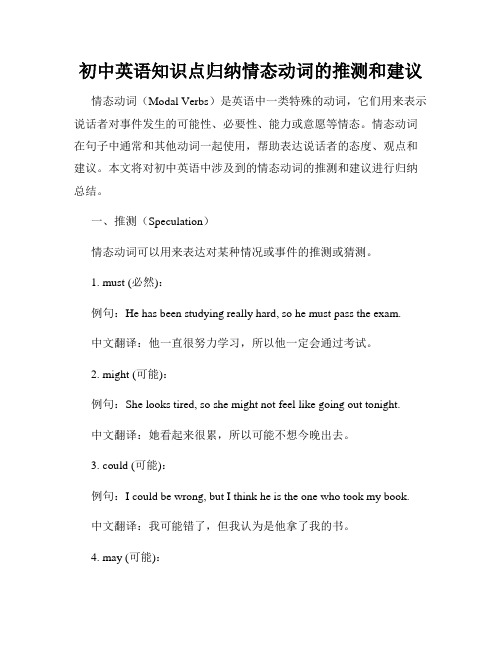
初中英语知识点归纳情态动词的推测和建议情态动词(Modal Verbs)是英语中一类特殊的动词,它们用来表示说话者对事件发生的可能性、必要性、能力或意愿等情态。
情态动词在句子中通常和其他动词一起使用,帮助表达说话者的态度、观点和建议。
本文将对初中英语中涉及到的情态动词的推测和建议进行归纳总结。
一、推测(Speculation)情态动词可以用来表达对某种情况或事件的推测或猜测。
1. must (必然):例句:He has been studying really hard, so he must pass the exam.中文翻译:他一直很努力学习,所以他一定会通过考试。
2. might (可能):例句:She looks tired, so she might not feel like going out tonight.中文翻译:她看起来很累,所以可能不想今晚出去。
3. could (可能):例句:I could be wrong, but I think he is the one who took my book.中文翻译:我可能错了,但我认为是他拿了我的书。
4. may (可能):例句:Tom may come to the party tonight, but he hasn't confirmed yet.中文翻译:汤姆可能会来参加今晚的派对,但他还没有确定。
5. can't (不可能):例句:She can't have forgotten her own birthday!中文翻译:她不可能忘记自己的生日!二、建议(Advice)情态动词还可以用来表达对他人的建议或提出自己的建议。
1. should (应该):例句:You should take a break and relax. You've been working too hard.中文翻译:你应该休息一下放松一下,你工作太辛苦了。
初二英语情态动词的具体用法全面解析

初二英语情态动词的具体用法全面解析【考纲解读】根据对情态动词部分在全国各地中考试题的分析可知,今后该部分将是重点考查点之一。
其考查重点为:1、情态动词在一般疑问句中的问与答2、情态动词表示猜测的用法3、will与shall的用法4、dare与need的用法【知识点梳理】情态动词的具体用法:(一)情态动词概说1.情态动词也是“辅助性”动词,用来表示说话人的语气或情态。
情态动词所表示的情态有:请求、命令、允诺、可能、需要、敢于、愿望、义务、能力等。
2.情态动词本身有词义,但词义不完全,不能单独用作谓语,没有人称和数的变化,且后面只跟动词原形。
如:她会唱英文歌曲。
She cans sing an English song.(F)She can sings an English song.(F)She can sing an English song.(T)3.有些情态动词的过去时与其原形相同,有些与原形不同。
(1) 与原形相同的有:must --- must ought to --- ought to(2) 与原形不同的有:can --- could will --- wouldmay --- might shall --- shouldneed --- needed dare --- dared have to --- had to(二)情态动词的种类:(见下表)(三)情态动词的否定形式:cannot --- can’t could not --- couldn’t may not--- mayn’tmight not--- mightn’t must not --- mustn’t will not --- won’twould not --- wouldn’t need not --- needn’t shall not --- shan’tshould not --- shouldn’t ought not --- oughtn’t dare not --- daren’t(四)常用情态动词的用法:1.can与could1). can(1)表示体力或脑力方面的“能力”,也能表示根据客观条件能做某事的“能力”。
外研版英语八年级英语句型及语法(英语情态动词)及解析百度文库

外研版英语八年级英语句型及语法(英语情态动词)及解析百度文库一、初中英语情态动词1.—He be in the classroom,I think.—No, he be in the classroom. I saw him go home a minute ago.A. can; may notB. must; may notC. may; mustn'tD. may; can't 【答案】 D【解析】【分析】句意:——我认为他可能在教室里。
——不,他肯定没有在教室里,我刚才看到他回家了。
must,can(could),may(might)可以表示猜测,must表示肯定猜测,用于肯定句,肯定……一定……;can't表示否定猜测,肯定不……,另外can(could),may (might),表示可能性猜测,可能……根据I think,可知把握较小,根据I saw him go home a minute ago.可知第二句把握大,故选D。
2.—Where is Monica? I can't find her anywhere.—She be in the library. She loves reading books when she is free.A. mustB. needC. can't【答案】 A【解析】【分析】句意:——莫妮卡在哪?我到处都找不到她。
——她肯定在图书馆,她喜欢空闲时看书。
A肯定,肯定句中表示推测,B需要,C不可能,否定句中表示推测,根据 She loves reading books when she is free ,可知是肯定句表示推测,故选A。
【点评】考查情态动词,注意情态动词表推测的用法。
3.— __________I wear a tie to Janet's birthday party?— No,you needn't. But do remember to bring her a present.A. MustB. ShouldC. NeedD. Can【答案】 A【解析】【分析】句意:——我必须戴领带去参加Jane的生日聚会吗?——不,你不必,但是记住给她带个礼物。
初中英语常用语法知识——情态动词知识点复习(含答案解析)
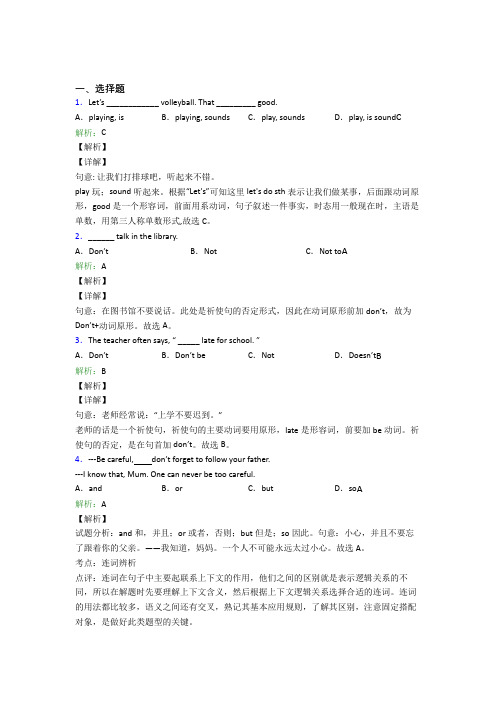
一、选择题1.Let’s ____________ volleyball. That _________ good.A.playing, is B.playing, sounds C.play, sounds D.play, is sound C解析:C【解析】【详解】句意: 让我们打排球吧,听起来不错。
play玩;sound听起来。
根据“Let's”可知这里let's do sth表示让我们做某事,后面跟动词原形,good是一个形容词,前面用系动词,句子叙述一件事实,时态用一般现在时,主语是单数,用第三人称单数形式,故选C。
2.______ talk in the library.A.Don’t B.Not C.Not to A解析:A【解析】【详解】句意:在图书馆不要说话。
此处是祈使句的否定形式,因此在动词原形前加don’t,故为Don’t+动词原形。
故选A。
3.The teacher often says, “ _____ late for school. ”A.Don’t B.Don’t be C.Not D.Doesn’t B解析:B【解析】【详解】句意:老师经常说:“上学不要迟到。
”老师的话是一个祈使句,祈使句的主要动词要用原形,late是形容词,前要加be动词。
祈使句的否定,是在句首加don’t。
故选B。
4.---Be careful, don’t forget to follow your father.---I know that, Mum. One can never be too careful.A.and B.or C.but D.so A解析:A【解析】试题分析:and和,并且;or或者,否则;but但是;so因此。
句意:小心,并且不要忘了跟着你的父亲。
——我知道,妈妈。
一个人不可能永远太过小心。
故选A。
考点:连词辨析点评:连词在句子中主要起联系上下文的作用,他们之间的区别就是表示逻辑关系的不同,所以在解题时先要理解上下文含义,然后根据上下文逻辑关系选择合适的连词。
八年级下册英语情态动词用法总结(完整)含答案

八年级下册英语情态动词用法总结(完整)含答案一、选择题1.--Would you mind opening the window? It’s too hot.--__________.A.Sorry. I wouldn’t.B.No, of course not.C.It doesn’t matter.D.Yes, please.2.—Are you going to offer some masks and alcohol wet wipes (酒精湿巾) to the people in the village?—________ They are in great need of these things.A.What a shame! B.Why not? C.Why me? D.What's wrong? 3.—Don’t forget to keep safe distance (距离) at least one meter, Mike!—________A.Sorry, I won’t.B.No, I can’t do it.C.Not at all. D.I hope not. 4.—Our family will go to Hangzhou for a holiday this summer.—________.A.Well done B.I am glad to hear thatC.Best wishes to you D.Have fun5.—I thought I’d try to repair the car myself.— __________ ! You know nothing about the car.A.No way B.Y ou can’t be serious C.I couldn’t agree more D.Don’t change a thing6.—I’m afraid I can’t do well in the sports meeting. I might let my classmates down.—_______. You don’t need to push yourself too hard.A.It’s a pleasure B.What a pity C.Take it easy D.You’re welcome 7.—It's a shame to ask you to lend me more money, but. . .— ______ . You really need money to keep on with your education.A.Don't be silly B.Forget it C.No way D.Don't mention it 8.—Amazingly, I've managed to finish the project by myself.—___________I told you it was easyA.With pleasure. B.Guess what? C.There you are! D.It doesn’t matter 9.--Would you like to go shopping with me on Saturday?-- . I have to help my mother with housework.A.I’m afraid not B.Take your timeC.Enjoy yourself D.That’s all right10.–This box is too heavy for me to carry upstairs.–__________A.You may ask for help B.I’ll give you a handC.Please do me a favor D.I’d come to help11.—I’m sorry. That wasn’t of much help.— ________. In fact, it was most helpful.A.Thanks anyway B.It doesn’t matter C.Of course not D.Sure it was12.—Another Friday! Let’s go to see the play tonight.—________ I will book the tickets online.A.My pleasure. B.That’s right.C.Why not? D.Never mind. 13.— I prefer western foo d. It’s delicious and good for us.—_______ ? But western food is said to be high in sugar and fat.A.Is that right B.How do you know thatC.Do you really think so D.Who told you that14.— I guess you want to play tennis in the park this afternoon.— _______. That’s exactly what I was thinking just now.A.It’s up to you B.Of course not C.You read my mind D.It’s hard to say 15.-Do you think the rain will stop tomorrow?-_____. It has rained for four days. It’s too wet everywhere.A.I hope not B.I don’t think soC.Don’t worry D.I hope so16.— Could you please clean your room?—_________. I’ll do it at once.A.Yes, sure B.Sorry, I can’t C.It doesn’t matter D.Here you are 17.— What do you think of the movie Mr. Bea ?—____. It’s very funny.A.I can’t stand it .B.I don’t mind it C.I love it. D.I hate it. 18.—Would you like a small or a large bowl of noodles? —_______. I’m very hungry. A.A small bowl B.A large bowl C.Yes, please D.No, thanks 19.—I have got a new job as a presenter in the Wenzhou Radio Station!—________.A.Come on B.Good idea C.Congratulations D.All right 20.—Do you like cartoons or scary movies?—_______. They can cheer me up.A.Yes, I do B.No, I don't C.Cartoons D.Scary movies 21.—I’m sorry I didn’t make it to your birthday party last night.— ________ I know you are busy recently.A.Why not? B.Don’t mention it.C.No way. D.That’s all right. 22.—Excuse me, can you give me some water? The cup is empty.—________A.Go ahead. B.My pleasure C.At your service D.You’d better not. 23.—You seem so happy today, Jack.—________? I won the first prize in the singing competition yesterday.A.So what B.How come C.Guess what D.Why not 24.—Anna, can you come to my party tomorrow night?—_________, but I have to stay at home because of the flu.A.I’d love to B.Sounds good C.That’s OK D.Why not 25.—It’s been a wonderful party. Thank you very much?—- ________________.A.With pleasure B.No , thanks C.It’s OK D.I’m glad you enjoyed it .26.—How about buying that coat?—________. It’s too expensive. I can’t afford it.A.That sounds good B.No way C.Good idea D.What a pity 27.—Could you help me look after my baby ________ I am away?—________.A.as; With pleasure B.while; My pleasure C.as; That’s all right D.while; With pleasure28.—How would you like your soup?—________.A.Very delicious B.With some tomatoes and eggs, pleaseC.I like it very much D.No, thanks29.—Don’t keep the water running when you brush your teeth.— ________ .A.I hope so B.I’m afraid not C.Sorry, I won’t D.It’s nothing 30.—How do you find the documentary DA VID Profile(国宝档案).—________. I can’t think too highly of it.A.It all depends B.It’s really wonderfulC.No one knows for certain D.It is not my cup of tea31.—Would you mind if I open the window?—_______.We need fresh air.A.Not at all B.Yes, of course C.You’d better not D.That’s all right 32.—I find it really unwise to go travelling during May Day holiday.—________! Wherever you go, it’s crowded with cars and people.A.Not exactly B.Forget it C.You said it D.It depends 33.—How do you like coffee, Minnie?—It tastes very terrible. ________.A.I have no idea B.I don’t mind it C.I really can’t stand it D.I can’t afford it 34.— Mr. Smith, I won the first prize in the competition.—______ I think you’ll do better and better.A.Congratulations! B.Good idea! C.That’s all right!D.What a shame! 35.—Oh, my love, you say you have ordered a dozen cups of bubble tea (奶茶)?—________A.Agree. B.Forget it. C.I really do. D.Are you kidding me? 36.—He is too short to be a successful basketball player.—________ Every dog has its day.A.I think so. B.It’s hard to say.C.That’s right.D.You’d better not. 37.—I just got a message from Ms. Yang and she said she would come to our meeting this afternoon.— She always has good ideas.A.Why not? B.What a pity! C.Time is up. D.That’ll be very nice. 38.—________!—Yes. It sounds gentle and relaxing.A.How good the vegetable soup is B.How exciting the storybook isC.What nice music Ann is playing D.What a beautiful flower Jim keeps 39.—Why don’t you join i n a club to practise speaking English?—________.A.That’s a good idea B.Never mind C.Yes, please D.Thank you 40.—Many people think women are better at cooking than men.—________. Most top chefs in the world are men.A.I agree B.I can’t agree more C.Not at all D.That’s not the case 41.—I’ll be away on a business trip. Would you mind looking after my cat?—Not at all. ________.A.It’s my pleasure B.I’d rather not.C.I’d like it.D.With pleasure. 42.—Do you think you could finish this project without help?—________. This is not the first time for me.A.Take care B.Don’t worry C.Not exactly D.Hurry up 43.—Our school football team has won the first prize in the match!—________A.Have a good time. B.Nice work. C.Never mind. D.Good luck. 44.—We can invite Kate and Paul to Baohe Park with us.—________ I’ll give them a call right now.A.Why not? B.What for? C.What’s up?D.Are you kidding? 45.—Mum, Joe has broken a cup!—________. Accidents always happen.A.Pretty good B.Of course C.It doesn’t matter D.That depends 46.—We’ll study in different schools next term. I hope you’ll enjoy your time in the new school!—________A.I’ll take your advice. B.The same to you. C.Congratulations!D.It doesn’t matter.47.— The dress I got is not the same color as that is shown online.—________? But if so, I promise we will send you another one.A.How come B.Who knows C.What for D.Why worry 48.—Michael was late for Mr. Smith’s chemistry class this morning.—________? As far as I know, he never came late to class.A.So what B.Why not C.How come D.Who cares 49.— Are you feeling any better now after taking the medicine?—________. I’m feeling even worse.A.You got it B.Never mind C.Sorry to hear that D.Quite the opposite50.— Mike, are you ready for the coming final exam?— ________. I have prepared it for weeks.A.You bet B.No deal C.Bad luck D.Have fun【参考答案】***试卷处理标记,请不要删除一、选择题1.B【解析】本题考查交际用语。
情态动词全部知识点总结
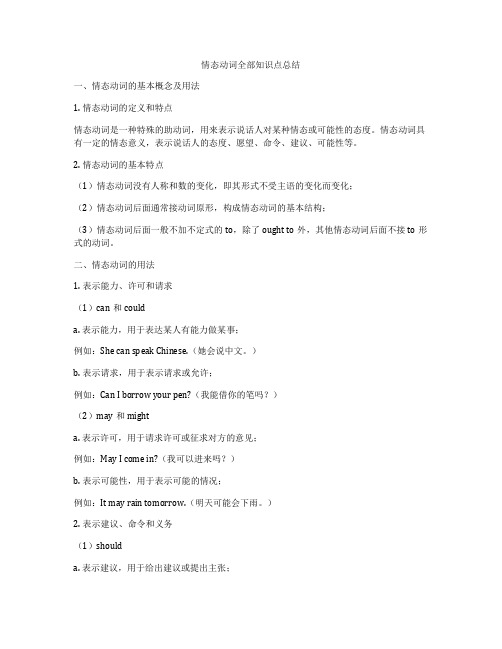
情态动词全部知识点总结一、情态动词的基本概念及用法1. 情态动词的定义和特点情态动词是一种特殊的助动词,用来表示说话人对某种情态或可能性的态度。
情态动词具有一定的情态意义,表示说话人的态度、愿望、命令、建议、可能性等。
2. 情态动词的基本特点(1)情态动词没有人称和数的变化,即其形式不受主语的变化而变化;(2)情态动词后面通常接动词原形,构成情态动词的基本结构;(3)情态动词后面一般不加不定式的to,除了ought to外,其他情态动词后面不接to形式的动词。
二、情态动词的用法1. 表示能力、许可和请求(1)can和coulda. 表示能力,用于表达某人有能力做某事;例如:She can speak Chinese.(她会说中文。
)b. 表示请求,用于表示请求或允许;例如:Can I borrow your pen?(我能借你的笔吗?)(2)may和mighta. 表示许可,用于请求许可或征求对方的意见;例如:May I come in?(我可以进来吗?)b. 表示可能性,用于表示可能的情况;例如:It may rain tomorrow.(明天可能会下雨。
)2. 表示建议、命令和义务(1)shoulda. 表示建议,用于给出建议或提出主张;例如:You should see a doctor.(你应该去看医生。
)b. 表示义务,用于表示责任或义务;例如:We should obey the law.(我们应该遵守法律。
)(2)ought toa. 表示责任或义务,用于表示应该做的事情;例如:You ought to apologize to her.(你应该向她道歉。
)3. 表示可能性和必然性(1)musta. 表示必然性,用于表示肯定的推断或必然的结论;例如:He must be at home now.(他现在一定在家。
)b. 表示义务,用于表示应遵守的规定或责任;例如:Students must wear school uniforms.(学生必须穿校服。
初二英语知识点02情态动词should和could的用法(解析版)

衔接点02情态动词should和could的用法1.—Mum,it’s too hot.________I swim in the lake?—No,you___________.That’s too dangerous!A.Should;can’tB.Need;mustn’tC.Must;needn’tD.Could;mustn’t【答案】D【解析】句意:——妈妈,太热了。
我能在湖里游泳吗?——不,你不能,那太危险了。
考查情态动词辨析。
第一个空,根据Mum,it’s too hot.____I swim in the lake?可知句意为“妈妈,太热了。
我能在湖里游泳吗?”表示征询意见,委婉的请求,用could;第二个空,根据前面的No,以及后面的That’s too dangerous!可知应是“不可以”,表示禁止用mustn’t,故选D。
2.—Will you stay here for dinner with us?—Sorry,I____________.My mother is waiting for me at home.A.mustn'tB.can'tC.needn'tD.couldn't【答案】B【解析】句意:——你愿意留下来和我们一起吃晚饭吗?——对不起,我不能。
我的母亲正在家里等我。
A. mustn't禁止;B.can't不能;C.needn't不必;D.couldn't不能。
根据上文Will you stay here for dinner with us?及Sorry可知这里是说不能,用Sorry,I can't对不起,我不能。
根据题意,故选B。
3.According to the notice,guests at this hotel______use the sports center at no extra cost.A.canB.shouldC.mustD.need【答案】A【解析】句意:根据通知,在这个宾馆的顾客可以不用额外地出钱就能使用体育中心。
情态动词的知识点总结
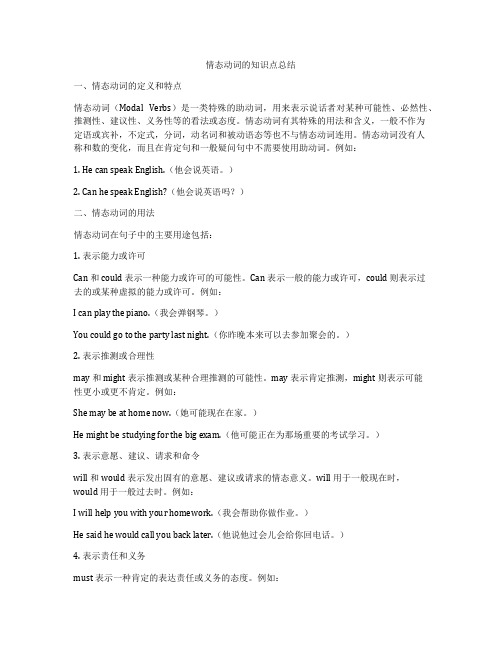
情态动词的知识点总结一、情态动词的定义和特点情态动词(Modal Verbs)是一类特殊的助动词,用来表示说话者对某种可能性、必然性、推测性、建议性、义务性等的看法或态度。
情态动词有其特殊的用法和含义,一般不作为定语或宾补,不定式,分词,动名词和被动语态等也不与情态动词连用。
情态动词没有人称和数的变化,而且在肯定句和一般疑问句中不需要使用助动词。
例如:1. He can speak English.(他会说英语。
)2. Can he speak English?(他会说英语吗?)二、情态动词的用法情态动词在句子中的主要用途包括:1. 表示能力或许可Can 和 could 表示一种能力或许可的可能性。
Can 表示一般的能力或许可,could 则表示过去的或某种虚拟的能力或许可。
例如:I can play the piano.(我会弹钢琴。
)You could go to the party last night.(你昨晚本来可以去参加聚会的。
)2. 表示推测或合理性may 和 might 表示推测或某种合理推测的可能性。
may 表示肯定推测,might 则表示可能性更小或更不肯定。
例如:She may be at home now.(她可能现在在家。
)He might be studying for the big exam.(他可能正在为那场重要的考试学习。
)3. 表示意愿、建议、请求和命令will 和 would 表示发出固有的意愿、建议或请求的情态意义。
will 用于一般现在时,would 用于一般过去时。
例如:I will help you with your homework.(我会帮助你做作业。
)He said he would call you back later.(他说他过会儿会给你回电话。
)4. 表示责任和义务must 表示一种肯定的表达责任或义务的态度。
例如:You must complete the task by tomorrow.(你必须在明天前完成任务。
情态动词知识点总结

情态动词知识点总结情态动词是英语中的一类特殊动词,用于表达说话人的态度、观点或情感。
情态动词具有一些独特的语法和用法规则,掌握了这些规则,我们就能更准确地表达自己的意思。
本文将对情态动词的知识点进行总结,以帮助读者加深对该语法现象的理解。
一、情态动词的定义和特点情态动词(modal verbs)是英语中的一类特殊动词,用于表示说话人的意愿、可能性、许可、推测、建议、命令等情态。
情态动词有一些独特的特点:1. 情态动词没有人称和数的变化。
即不论主语是什么,情态动词的形式都保持不变。
2. 情态动词后面接动词原形(除了 ought to 外)。
3. 情态动词本身没有时态和语态的变化,通过与其他动词的搭配来表达时态和语态。
4. 情态动词不能单独用作谓语,必须与其他动词搭配使用。
二、常见的情态动词及其用法下面是常见的情态动词及其用法的详细介绍:1. can表示能力、许可或可能性。
例如:- I can swim.(我会游泳。
)- Can I borrow your pen?(我能借用你的笔吗?)- It can be difficult to learn a new language.(学习一门新语言可能会很困难。
)2. could表示过去或虚拟的能力、许可或可能性。
例如:- When I was young, I could run very fast.(当我年轻的时候,我跑得很快。
)- If I had more time, I could study abroad.(如果我有更多时间,我可以出国留学。
)- Could you help me with this problem?(你能帮我解决这个问题吗?)3. may表示可能性、许可或问询。
例如:- It may rain tomorrow.(明天可能会下雨。
)- May I use your phone?(我可以用一下你的手机吗?)- May I ask you a question?(我可以问你一个问题吗?)4. might表示可能性,用法与 may 相似。
初中英语情态动词详细用法归纳(含练习及答案)
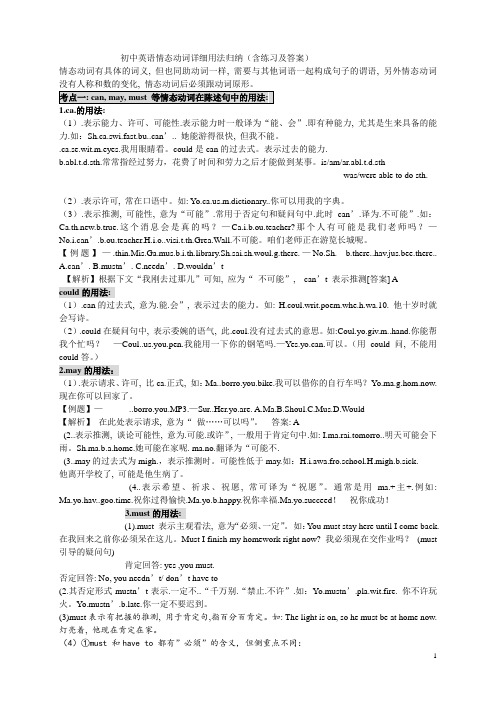
初中英语情态动词详细用法归纳(含练习及答案)情态动词有具体的词义, 但也同助动词一样, 需要与其他词语一起构成句子的谓语, 另外情态动词没有人称和数的变化, 情态动词后必须跟动词原形。
1.ca.的用法:(1).表示能力、许可、可能性.表示能力时一般译为“能、会”.即有种能力, 尤其是生来具备的能力.如:Sh.ca.swi.fast.bu..can’.. 她能游得很快, 但我不能。
.ca.se.wit.m.eyes.我用眼睛看。
could是can的过去式。
表示过去的能力.b.abl.t.d.sth.常常指经过努力,花费了时间和劳力之后才能做到某事。
is/am/ar.abl.t.d.sthwas/were able to do sth.(2).表示许可, 常在口语中。
如: .m.dictionary..你可以用我的字典。
(3).表示推测, 可能性, 意为“可能”.常用于否定句和疑问句中.此时can’.译为.不可能”.如:Ca.th.new.b.true.这个消息会是真的吗?—Ca.i.b.ou.teacher?那个人有可能是我们老师吗?—No.i.can’.b.ou.teacher.H.i.o..visi.t.th.Grea.Wall.不可能。
咱们老师正在游览长城呢。
【例题】—.thin.Mis.Ga.mus.b.i.th.library.Sh.sai.sh.woul.g.there.—No.Sh.__b.there..hav.jus.bee.there..A.can’.B.mustn’.C.needn’.D.wouldn’t【解析】根据下文“我刚去过那儿”可知, 应为“不可能”, can’t 表示推测[答案] Acould的用法:(1).can的过去式, 意为.能.会”, 表示过去的能力。
如: H.coul.writ.poem.whe.h.wa.10. 他十岁时就会写诗。
(2).could在疑问句中, 表示委婉的语气, 此.coul.没有过去式的意思。
初二英语知识点19情态动词must、can、can't(解析版)
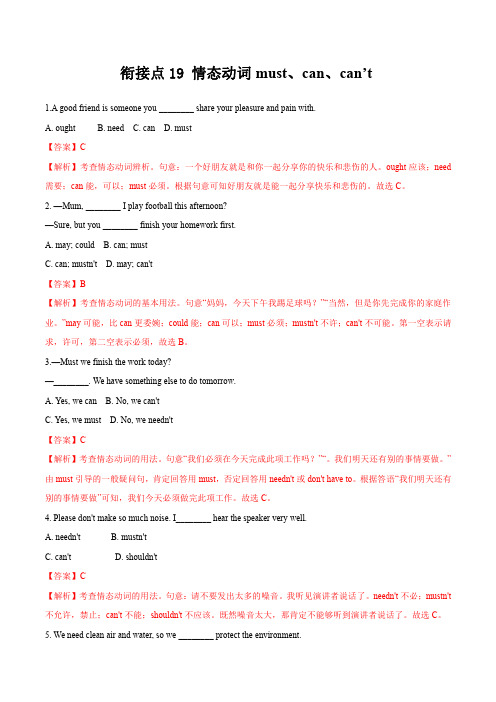
10. —I still haven't found my pet dog. —Iቤተ መጻሕፍቲ ባይዱm sorry to hear that. You ________ be very sad. A. can B. should C. must D. will 【答案】C 【解析】考查情态动词表推测。句意“我仍没有找到我的宠物狗。”“听到那个消息我很伤心。你非常难过。”can 能,可以;should 应该;must 必须,一定;will 将。根据是上句“我仍没有找到我的宠物狗。”可知对方一定 很难过。故选 C。 一.完形填空
不允许,禁止;can't 不能;shouldn't 不应该。既然噪音太大,那肯定不能够听到演讲者说话了。故选 C。
5. We need clean air and water, so we ________ protect the environment.
A. can B. may C. must D. might 【答案】C 【解析】考查情态动词辨析。句意:我们需要清洁的空气和水,因此我们保护环境。can 能,能够;may 可 以,可能;must 必须,一定;might 可能。根据前半句可知此处指我们必须保护环境。故选 C。
6.—What should we do to protect the fish in the river? —We ________ throw rubbish into the river. A. need B. needn't C. must D. mustn't 【答案】D 【解析】考查情态动词辨析。句意“我们应该做什么来保护河里的鱼?”“我们往河里扔垃圾。”need 需要; needn't 不需要;must 必须;mustn't 禁止。此处表示禁止,用 mustn't。故选 D。 7.—What does Justin Bieber's song Never Say Never impress you most? —It tells us that we ________ do almost anything if we never give up. A. can B. have to C. should D. need 【答案】A 【解析】考查情态动词的用法。句意“贾斯汀·比伯的歌 Never Say Never 给你最深的印象是什么?”“它告诉 我们如果我们从不放弃,我们几乎做任何事。”can 能够,表示个人的能力;have to 不得不;should 应该; need 需要。根据句意,体现主语的能力。故选 A。 8.Students ________ enjoy the colorful school life if they study at home instead of going to school. A. mustn't B. can't C. must D. can 【答案】B 【解析】考查情态动词辨析。句意:如果学生们待在家里而不是去学校,他们享受丰富多彩的学校生活。 mustn't 禁止;can't 不可能;must 必须;can 可以。根据前半句“study at home”和“going to school”的对比,可 知空格处表示“不能享受学校生活”。故选 B。 9. —I hear you have a home robot. —Yes, it's amazing. It ________ do all my housework. A. must B. should C. could D. can 【答案】D 【解析】考查情态动词辨析。句意“我听说你有一个家庭机器人。”“是的,很令人惊奇。它做所有的家务。”must 必须;should 应该;could 可以,能够,can 的过去式;can 可以,能够。根据句意判断,此处语境表达机器 人的能力,由句子为一般现在时知,横线处也应为一般现在时。故选 D。
【英语】情态动词知识点总结

英语】情态动词知识点总结一、初中英语情态动词1.—Mum, I play football this afternoon?—Sure, but you finish your homework first.A. may; couldB. can; mustC. can; mustn'tD. may; can't【答案】B【分析】句意:-妈妈,今天下午我能踢足球吗?-当然,但是你必须先完成作业。
前句提请求,can,may 都可以;后句,由sure 可知后句用肯定回答。
Could 表示一种委婉的语气;must 表示主观愿望:必须。
妈妈要求孩子“必须”先完成作业。
故选B。
【点评】考查情态动词辨析,may 表示请求时候的回答用语。
2.—Where is Monica? I can't find her anywhere.—She be in the library. She loves reading books when she is free.A. mustB. needC. can't【答案】A【解析】【分析】句意:——莫妮卡在哪?我到处都找不到她。
——她肯定在图书馆,她喜欢空闲时看书。
A肯定,肯定句中表示推测,B需要,C不可能,否定句中表示推测,根据She loves reading books when she is free ,可知是肯定句表示推测,故选 A 。
【点评】考查情态动词,注意情态动词表推测的用法。
3.—Sorry, I forgot to take money with me. Maybe I can't buy the book you like.—Mum, you _____ worry about it. We can pay by Alipay (支付宝).A. can'tB. needn'tC. mustn'tD. shouldn't【答案】B【解析】【分析】句意:——对不起,我忘记带钱了。
初二英语常用语法知识——情态动词知识点总结(含答案解析)

一、选择题1.-Let's make fruit salad.- _____________ .A.No,I'm not B.Thank you C.That's all right D.That's a good idea D 解析:D【解析】【详解】句意:——让我们来做水果沙拉。
——好主意。
A. No, I'm not不,我不是;用来回答一般疑问句;B. Thank you谢谢你;C. That's all right没关系;D. That's a good idea好主意。
本题中第一句话为建议,让我们做某事,回答为同意或不同意。
故选D。
2.—_____________ dressed now! We have to go in ten minutes.—OK, Mom.A.Getting B.Get C.To get D.Gets B解析:B【解析】【详解】句意:——现在就穿上衣服!十分钟之后我们必须走。
——好的,妈妈。
考查祈使句。
空格所在句为祈使句,祈使句以动词原形开头。
根据句意结构,可知选B。
3.Don’t________ in the classroom. It’s important ________ quiet when you study. A.talk, keep B.to talk, keep C.talk, to keep D.to talk, to keep C解析:C【解析】【详解】句意:不要在教室里交谈。
当你学习的时候保持安静是重要的。
talk交谈,原形;to talk交谈,动词不定式;keep保持;原形;to keep保持,动词不定式。
第一空是否定祈使句,其结构是Don’t+动词原形。
排除BD;It’s important+to do sth.表示做某事是重要的。
排除A。
根据题意,故选C。
【点睛】祈使句的否定结构是以“Don”t+动词原形”开头.例如:Don”t go there,please.请别去那儿.Don”t be late.不要迟到.4.Don’t _______TV too much . It’s bad for your eyes .A.watch B.watchedC.watching D.to watch A解析:A【解析】【分析】【详解】句意:不要看太多的电视,对你的眼睛不好。
初中情态动词知识点归纳

初中情态动词知识点归纳1.情态动词的定义:情态动词是一类特殊的助动词,用来表示说话者对其中一种动作或状态的态度、意愿、能力、推测等。
2.情态动词的特点:a.情态动词本身没有人称和数的变化;b.后面一般不加动词的“s”形式;c.后面直接接动词原形。
3.情态动词的用法:a. 表示能力和可能性:can,could,may,might,shall,should,will,would;b. 表示命令和建议:shall,should,ought to,must;c. 表示义务和必须:must,should,ought to;d. 表示推测和可能性:may,might,could;e. 表示许可和禁止:may,can,mustn't,shouldn't;f. 表示愿望和要求:would like,would rather,should;g. 表示意愿和决心:will,would;h. 表示猜测和推测:could,might。
4.情态动词的否定形式:a. 在情态动词之后加not,构成否定形式,例如:can not,could not,may not,might not,shall not,should not,will not,would not等;b. 能力和意愿的否定形式:cannot,could not,may not,might not,will not,would not。
5.情态动词的疑问形式:b. 以情态动词开头的特殊疑问句:疑问词+情态动词+主语+动词原形,例如:What can she do? Where should we go? Who could help me?6.情态动词的省略:a.在与已知的情况一致时,情态动词可以省略;b. 在直接接不定式的情态动词后,可以省略to。
7.典型的情态动词搭配:a. can/could: 表示能力和可能性,例如:I can swim. He could play the piano when he was young.c. must: 表示推测和肯定,例如:She must be at home. You must be tired after such a long journey.d. should: 表示建议和应该,例如:You should study hard. She should go to bed early.e. will/would: 表示意愿和将要,例如:I will help you. He would like to go to the park.以上是初中情态动词的知识点归纳。
初二上册人教版英语情态动词含解析

初二上册人教版英语情态动词含解析一、选择题1.—Would you like a small or a large bowl of noodles? —_______. I’m very hungry.A.A small bowl B.A large bowl C.Yes, please D.No, thanks 2.—I’m going hiking this afternoon. Would you like to go with me?—______, but I must finish my homework first.A.Sorry, I don’t B.That’s right C.I’d love to D.Not at all 3.—Oh, no! There isn't any salt left.—____________! I’ll buy some when I go into town.A.Good idea B.Go ahead C.Never mind D.Not at all 4.— I find it difficult to fall asleep before exams. Could you help me?— ___________. We have helped many students with similar problems.A.No problem B.Come on C.Well done D.What a pity 5.—I’m afraid I can’t get good grades in the P.E. exam.—________! Train as much as you can.A.Well done B.Keep trying C.Enjoy yourself D.Be careful 6.—I’m afraid I can’t do well in the sports meeting. I might let my classmates down.—_______. You don’t need to push yourself too hard.A.It’s a pleasure B.What a pity C.Take it easy D.You’re welcome 7.– Would you like me to lock the door?– _______A.Yes, I’d like to.B.It’s a pleasure.C.Yes, please. D.It doesn’t matter. 8.—Amazingly, I've managed to finish the project by myself.—___________I told you it was easyA.With pleasure. B.Guess what? C.There you are! D.It doesn’t matter 9.--Would you like to go shopping with me on Saturday?-- . I have to help my mother with housework.A.I’m afraid not B.Take your timeC.Enjoy yourself D.That’s all right10.–This box is too heavy for me to carry upstairs.–__________A.You may ask for help B.I’ll give you a handC.Please do me a favor D.I’d come to help11.—It’s been a wonderful party. Thank you very much?—- ________________.A.With pleasure B.No , thanks C.It’s OK D.I’m glad you enjoyed it .12.—Don’t for get to keep safe distance (距离) at least one meter, Mike!—________A.Sorry, I won’t.B.No, I can’t do it.C.Not at all. D.I hope not. 13.— Could you please clean your room?—_________. I’ll do it at once.A.Yes, sure B.Sorry, I can’t C.It doesn’t matter D.Here you are 14.—I just got a message from Ms. Yang and she said she would come to our meeting this afternoon.— She always has good ideas.A.Why not? B.What a pity! C.Time is up. D.That’ll be very nice. 15.—Would you please help me with my spoken English?—__________. First you should know practice makes perfect.A.That’s right B.No problem C.Quite well D.No, thanks 16.—Lucy, can you help me with my history?—________. I am good at it.A.With pleasure B.I’m afraid not C.Sorry, I can’t D.No way17.— Shall we go to Nanjing Green Expo Park to enjoy the beautiful flowers this afternoon?—________. Let’s go there by bike.A.I think so B.That’s all right C.My pleasure D.Sounds great 18.—I have got a new job as a presenter in the Wenzhou Radio Station!—________.A.Come on B.Good idea C.Congratulations D.All right 19.—Sir, this is your order, two chicken hamburgers and a cup of coffee. ________—I’ll have them here.A.For here or to go? B.Something to drink? C.Anything else? D.Is that OK? 20.—Why not take your son to watch the new film A Little Red Flower?—__________.A.Good idea B.No problem C.Good luck D.No way 21.—Do you like cartoons or scary movies?—_______. They can cheer me up.A.Yes, I do B.No, I don't C.Cartoons D.Scary movies 22.—I’m sorry I didn’t make it to your birthday party last night.— ________ I know you are busy recently.A.Why not? B.Don’t mention it.C.No way. D.That’s all right. 23.—Excuse me, can you give me some water? The cup is empty.—________A.Go ahead. B.My pleasure C.At your service D.You’d better not. 24.—You seem so happy today, Jack.—________? I won the first prize in the singing competition yesterday.A.So what B.How come C.Guess what D.Why not25.-Do you think the rain will stop tomorrow?-_____. It has rained for four days. It’s too wet everywhere.A.I hope not B.I don’t think soC.Don’t worry D.I hope so26.—I wonder if Tenny is doing well in her new school.—________. She is old enough to look after herself well.A.You’re welcome B.Good luck C.It’s a pity D.No need to worry 27.—All of Mark Twain’s novels are popular.— ________. Especially The Adventures of Tom Sawyer.A.I can’t agree more B.That’s not the case C.That’s not the point D.Don’t mention it 28.—Could you help me look after my baby ________ I am away?—________.A.as; With pleasure B.while; My pleasure C.as; That’s all right D.while; With pleasure29.—How would you like your soup?—________.A.Very delicious B.With some tomatoes and eggs, please C.I like it very much D.No, thanks30.—Time is up. I have to go now.—________ ! We don’t have more time to talk.A.That’s cool B.That’s the answer C.That’s a pity D.That’s good news 31.—Don’t keep the water running when you brush your teeth.— ________ .A.I hope so B.I’m afraid not C.Sorry, I won’t D.It’s not hing 32.—How do you find the documentary DA VID Profile(国宝档案).—________. I can’t think too highly of it.A.It all depends B.It’s really wonderfulC.No one knows for certain D.It is not my cup of tea33.—Would you mind if I open the window?—_______.We need fresh air.A.Not at all B.Yes, of course C.You’d better not D.That’s all right 34.—I find it really unwise to go travelling during May Day holiday.—________! Wherever you go, it’s crowded with cars and people.A.Not exactly B.Forget it C.You said it D.It depends 35.—Only those who have a lot in common can get along well.—________ Opposites sometimes attract.A.I think so. B.I don’t think so.C.I don’t care.D.I hope so. 36.—Hi, everybody! Here is the music.—________. Let’s dance to the music.A.That’s no good B.Here we go C.That’s a shame D.Have a good time 37.—Here’s your change.—________A.My pleasure. B.Thank you. C.With pleasure. D.No problem. 38.—________!—Yes. It sounds gentle and relaxing.A.How good the vegetable soup is B.How exciting the storybook isC.What nice music Ann is playing D.What a beautiful flower Jim keeps39.—Can you tell me how to get to the park?—________—Thank you all the same.A.Show me the map, please.B.Certainly. It’s opposite the museum.C.Sorry, I don’t know. I’m a st ranger here.D.Sure. Turn right and go along Rock Road.40.—Many people think women are better at cooking than men.—________. Most top chefs in the world are men.A.I agree B.I can’t agree more C.Not at all D.That’s not the case 41.— Wow, what a good smell! Can I have a piece of cake?— ________A.No way. B.Good idea! C.HeIp yourself. D.What a pity! 42.—Thank you for helping to build hospitals during this special period.— ________ ! Many hands make light work.A.My pleasure B.All right C.Never mind D.None of my business43.— Would you mind my turning on the TV? The New Year concert has just begun.— ________. Just go ahead.A.Please don’t B.Better not C.Of course not D.I’m afraid not 44.—I prefer to chat online. I’ve got to know many friends on the Interne t.—________. Few of them would become your real friends.A.I can’t agree more B.I’m pleased to know thatC.That’s for sure D.That’s not the case45.—We’ll study in different schools next term. I hope you’ll enjoy your time in the new school!—________A.I’ll take your advice. B.The same to you. C.Congratulations!D.It doesn’t matter.46.— The movie Lost in Russia sends a message about the importance of family.— ________. It reminds me of my parents.A.I hope so B.That’s all right C.You bet D.I don’t thi nk so 47.— Are you feeling any better now after taking the medicine?—________. I’m feeling even worse.A.You got it B.Never mind C.Sorry to hear that D.Quite the opposite 48.— I guess you want to play tennis in the park this afternoon.—_______. That’s exactly what I was thinking just now.A.It’s up to you B.Of course not C.You read my mind D.It’s hard to say 49.—Can I look at the menu for a few more minutes before I decide?—Of course. ________, Sir.A.Make yourself at home B.Enjoy yourself C.It doesn’t matterD.Take your time50.— Mike, are you ready for the coming final exam?— ________. I have prepared it for weeks.A.You bet B.No deal C.Bad luck D.Have fun【参考答案】***试卷处理标记,请不要删除一、选择题1.B【解析】情景交际. A small bowl一小碗;A large bowl一大碗;Yes, please 是的,请吧; No, thanks 不,谢谢. 句意:你想要一大碗还是一小碗面条?根解析:B【解析】情景交际. A small bowl一小碗;A large bowl一大碗;Yes, please 是的,请吧; No, thanks 不,谢谢.句意:你想要一大碗还是一小碗面条?根据后文I’m very hungry,可知答案为B2.C【解析】句意:-今天下午我要去徒步旅行。
初中英语情态动词用法归纳

1. I dare to swim across this river.
2. He doesn’t dare (to) answer.
----Might/ May I smoke in this room? ---- No, you mustn’t. ---- May/Might I take this book out of the room? ---- Yes, you can. (No, you can’t / mustn’t. ) 用May I...?征徇对方许可时比较正式和客气,而用Can I...?在
整理ppt
总结归纳
can
表示能力,意为 “能 会”
表示推测, 意为 “可能”, 常用于否定句和疑问句中
表示请求, 允许, 意为“可以”
could can 的过去式,意为“能、会”, 表示过去的能力
在疑问句中表示委婉请求
may 表示请求、许可,意为“可以”
表示推测,常用于肯定句中,意为“可能、也许”
用must, have to, ought to, should代替。 1.You needn’t come so early. 2. ---- Need I finish the work today?
---- Yes, you must. / No, you needn’t.
整理ppt
四、 dare, need
三、 must, have to
1) 表示命令,“必须、必要”。 You must come in time. 在回答引出的问句时,如果是否定的,不能用mustn’t(禁止,
- 1、下载文档前请自行甄别文档内容的完整性,平台不提供额外的编辑、内容补充、找答案等附加服务。
- 2、"仅部分预览"的文档,不可在线预览部分如存在完整性等问题,可反馈申请退款(可完整预览的文档不适用该条件!)。
- 3、如文档侵犯您的权益,请联系客服反馈,我们会尽快为您处理(人工客服工作时间:9:00-18:30)。
初二英语英语情态动词知识点总结含解析百度文库一、初中英语情态动词1.—Must I clean the classroom now? —No, you_______.A. mustn'tB. can'tC. needn't【答案】 C【解析】【分析】句意:--我必须现在把教室打扫干净吗?--不,你不必。
must I do …?的否定回答是No, you needn't 或者 No , you don't have to 。
根据是否定回答,故选C。
2.All passengers ______ go through safety check before they take a plane.A. canB. mayC. mustD. could【答案】 C【解析】【分析】句意:所有乘客登机前必须接受安全检查。
A. can能够,表示能力;B. may可以,表示许可;C. must必须;D. could可能,可以。
登机前必须安检。
故选C。
【点评】情态动词词义辨析。
以及can、may、must、could四个词的词义和用法。
3.He _________ work on the farm every day. I'm sure about that because his skin is very black.A. can'tB. mayC. mustD. couldn't【答案】 C【解析】【分析】句意:他一定每天在农场工作,我敢肯定,因为他的皮肤很黑。
A. can't不可能,对事情表示否定推测;B. may可以,可能;C. must一定、必须,表示非常肯定的推测;D. couldn't不能。
根据I'm sure about that because his skin is very black.可知他是在农场上工作,此处表示肯定的推测,故选C。
【点评】此题考查情态动词。
要掌握每个情态动词的使用方法。
4.—Life is becoming convenient with the Internet.—That's true! Almost everything ______ be done online.A. mustB. couldC. shouldD. can't【答案】 B【解析】【分析】句意:——生活正随着网络变得方便。
——那是真的。
几乎所有的事情可以在网上完成。
A必须,B可以,C将,D不能。
根据 Life is becoming convenient with the Internet. 生活正随着网络变得方便,可知应该是很多事情可以在网上完成,故选B。
【点评】考查情态动词。
注意理解和掌握情态动词的不同用法。
5.A hard-working man ______ become a great scientist, but a great scientist _______ be a hard-working man.A. can't; canB. may not; mustC. can't; mustD. may not; can【答案】 B【解析】【分析】句意:一个勤奋的人可能不会成为一位伟大的科学家,但是一位伟大的科学家一定是一个勤奋的人。
can't不可能,不会;can可能,能,会;may not 可能不;must 必须,一定;结合句意,可知,第一个空为“可能不”,第二个空为“一定”,故答案为B。
【点评】考查情态动词。
掌握情态动词表推测时的意义和用法。
6.Look at the sign! It says “No Smoking!” You ________ smoke here. It's dangerous.A. mustn'tB. ought not toC. needn'tD. don't have to【答案】 A【解析】【分析】句意:看这个标志!上面写道“禁止吸烟!“你不能抽烟。
这是危险的。
A.mustn't 禁止,不允许;B.ought not to不应该,不应当;C.needn't不必;D.don't have to 不必。
根据“No Smoking!”可知此处禁止吸烟,故答案为A。
【点评】考查情态动词。
掌握情态动词的意义和用法。
7.Teenagers allowed to drive .A. should not beB. should be notC. not should be【答案】A【解析】【分析】句意:年轻人不应该被允许驾车。
Should是情态动词,其否定表达一般在在后面加副词not,故选A。
【点评】此题考查含有情态动词的被动语态的否定形式。
平时注意记忆情态动词的记忆和用法。
8.You be tired after walking for such a long time. Sit down and have a rest.A. canB. can'tC. mustn'tD. must【答案】 D【解析】【分析】句意:走了这么长时间你一定很累了。
坐下休息一下吧。
can能,能够,can't不能,对事物进行否定推测;mustn't一定不是,禁止,must一定,对事物进行肯定推测,根据after walking for such a long time,可以肯定你一定很累,所以是进行肯定推测,情态动词使用must,故选D。
【点评】此题考查情态动词。
弄清每个情态动词的使用规则,根据句意确定所使用的情态动词。
9.—Who it be that is knocking at the door?—It be father, but I'm not sure.A. call; mustB. can; mayC. must; canD. may; must【答案】 B【解析】【分析】句意:——敲门的人可能是谁呢?——他可能是父亲,但是我不确定。
第一空,can可能,表猜测用语疑问句形式,may是表可能;第二空,根据后面的but I'm not sure,可知表示不确定的猜测,应填may,故选B。
【点评】此题考查情态动词辨析。
先弄清每个情态动词的使用规则。
根据上下文的联系确定情态动词的使用。
10.—I wonder if this smart phone is Mary's.—It _______ belong to her. _______ is totally different from this one.A. mustn't; HerB. can't; HerC. can't; HersD. may; Hers【答案】C【解析】【分析】句意:――我想知道这个智能机是否是玛丽的。
――不可能属于她,她的和这个完全不同。
情态动词表示推测时,用must表示“一定”,用might, could表示“可能”,用can't表示“不可能”。
从句意看,这手机与她的完全不同,故不可能是她的,前面用can't。
形容词性的物主代词后一定有一个被修饰的名词,名词性的物主代词后没有被其修饰的词,本题后没有被修饰的词,用名词性的物主代词,“她的”:hers。
故选C。
11.I can't go with you. I _______ stay at home until my parents come back.A. canB. mayC. mustD. could【答案】 C【解析】【分析】句意:我不能和你一起去。
我必须呆在家直到我父母回来。
A. can能,表示能力;B. may可以,表示许可;C. must必须,强调主观愿望;D. could可以,表示允许、请求。
父母没回来前,我必须待在家。
故选C。
【点评】此题考查情态动词的用法。
12.—___________ I bring you all the magazines right now?— No, you don't have to, but you give them to me tomorrow.A. May, canB. Should, mustC. Can, canD. Must, had better【答案】 D【解析】【分析】句意为:—我必须给你马上把所有的杂志都拿来吗?—不,不必。
但是你最好明天给我。
Can表示能够,may表示可能,should表示应该,must表示必须,had better表示最好做某事。
根据语境可知,这里表示必须,不得不,并建议作某事,结合选项可知应选D【点评】本题考查情态动词辨析。
以及may、should、can、must、had better五个词的词意和用法。
13.Rock music ______ sound popular with the young, but it's not the favor of the aged people.A. mustB. needC. shouldD. may【答案】 D【解析】【分析】句意:摇滚音乐在年轻人中听起来受欢迎,但是它不受上了年龄的人的赞同。
must, 表示猜测时,指把握比较大的肯定猜测,肯定……;need需要;should,应该;may,表示把握比较小的肯定猜测,可能,也许。
结合句意,故选D。
【点评】考查情态动词辨析,注意几个常见情态动词的意思和用法。
14.— Shall I book some seats for the concert?—______. I've done that.A. Yes, you mayB. No, you mustn'tC. No, you needn'tD. No, you can't【答案】C【解析】【分析】Yes, you may是的,你可以;No, you mustn't 不,你千万不要;No, you needn't不,你不必;No, you can't不,你不能。
句意:我要预定一些音乐会的座位吗?根据下文,我已经办了。
可知选C最符合语境。
【点评】考查交际用语15.— We've ordered too much food. I eat any more.—Never mind. Let' take it home.A. can'tB. mustn'tC. needn'tD. shouldn't【答案】 A【解析】【分析】句意:——我们已经点了太多的食物,我不能再吃了。
